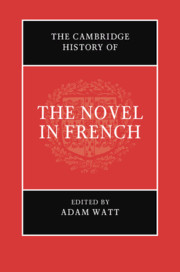Book contents
- The Cambridge History of the Novel in French
- The Cambridge History of the Novel in French
- Copyright page
- Contents
- Figures
- Contributors
- Acknowledgements
- Note on Conventions
- Chronology
- Introduction
- Part I Beginnings: From the Late Medieval to Madame de Lafayette
- 1 Late Medieval Precursors to the Novel: ‘aucune chose de nouvel’
- 2 Cultural Transmission and the Early French Novel
- 3 The Rise of the Novel in Sixteenth-Century France?
- 4 The Evolution of the Novel System in the Long Seventeenth Century
- 5 Seventeenth-Century French Women Writers and the Novel: A Challenge to Literary History
- 6 Madame de Lafayette and La Princesse de Clèves as Landmark
- Part II The Eighteenth Century: Learning, Letters, Libertinage
- Part III After the Revolution: The Novel in the Long Nineteenth Century
- Part IV From Naturalism to the Nouveau Roman
- Part V Fictions of the Fifth Republic: From de Gaulle to the Internet Age
- Index
- References
3 - The Rise of the Novel in Sixteenth-Century France?
from Part I - Beginnings: From the Late Medieval to Madame de Lafayette
Published online by Cambridge University Press: 04 February 2021
- The Cambridge History of the Novel in French
- The Cambridge History of the Novel in French
- Copyright page
- Contents
- Figures
- Contributors
- Acknowledgements
- Note on Conventions
- Chronology
- Introduction
- Part I Beginnings: From the Late Medieval to Madame de Lafayette
- 1 Late Medieval Precursors to the Novel: ‘aucune chose de nouvel’
- 2 Cultural Transmission and the Early French Novel
- 3 The Rise of the Novel in Sixteenth-Century France?
- 4 The Evolution of the Novel System in the Long Seventeenth Century
- 5 Seventeenth-Century French Women Writers and the Novel: A Challenge to Literary History
- 6 Madame de Lafayette and La Princesse de Clèves as Landmark
- Part II The Eighteenth Century: Learning, Letters, Libertinage
- Part III After the Revolution: The Novel in the Long Nineteenth Century
- Part IV From Naturalism to the Nouveau Roman
- Part V Fictions of the Fifth Republic: From de Gaulle to the Internet Age
- Index
- References
Summary
In the first decades of printing, medieval romances were edited and printed en masse, sometimes in luxurious in-folio formats. Sixteenth-century works of long prose narrative also drew on Classical epic and the dialogue. Notwithstanding these significant classical and medieval influences, there was no formal theorization of the novel in the sixteenth century—and indeed no single term to designate 'the novel' in this period. This absence of rigorous theorization and terminology contributed to making the period's vernacular prose narrative a privileged medium for literary experimentation: Rabelais's works were of course experimental in the highest sense, but other forms were also forged and promoted: in particular, sentimental and pastoral forms as well as the humanist model of the Greek novel based on Heliodorus. This period also forged new devices such as suspense and serialization, which would become signature features of the novel in the nineteenth century. Through all its incarnations and in the midst of formal experimentation, long prose narrative in this period opened a new horizon for reading: as a hobby, a pleasurable activity to fill the idle moments of life.
- Type
- Chapter
- Information
- The Cambridge History of the Novel in French , pp. 54 - 70Publisher: Cambridge University PressPrint publication year: 2021



